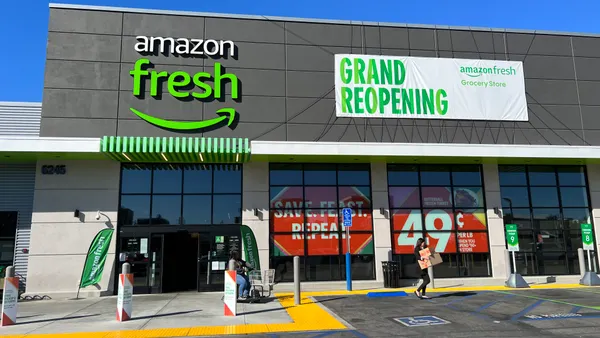Dive Brief:
- Grocery stores have grown into hubs for health and wellness guidance, with a majority (70%) of food industry companies operating with nutrition, health and well-being strategies, according to a new FMI — The Food Industry Association report published Thursday.
- Food-as-medicine initiatives are also gaining momentum, with top areas of focus including prevention and the development of medically tailored meals.
- FMI’s “Food Industry Contributions to Health and Well-Being” report serves as a first-time benchmark that incorporates surveys of product suppliers and food retailers.
Dive Insight:
A major way grocers, food retailers and suppliers are meeting consumer demand for nutrition and health and well-being services is through product reformulation, FMI Senior Director of Health and Wellbeing Krystal Register said during a Thursday media briefing.
“[A] large majority of companies surveyed are reformulating their products, both when it comes to national brands and private store branded products, to provide healthier options,” Register said. She noted these efforts oftentimes include reducing sodium, reducing added sugars and adding beneficial nutrients.
Register noted that a key step for product reformation is pairing it with consumer education: “From my standpoint as a registered dietitian, I think this is one of the most important pieces.”
To succeed in this area, more grocers and food suppliers are giving dietitians as well as registered nurses, nurse practitioners, medical doctors and health coaches roles in strategic leadership, marketing and communications, and other key roles, according to FMI’s report.
Currently, 82% of FMI’s food industry respondents employ registered dietitians and half said these dietitians are staffed in strategic leadership roles, per the report’s findings.
Beyond their own stores and staff, food industry companies are also collaborating more with community organizations, health systems and other networks focused on health and well-being. More than half (54%) of survey respondents anticipate partnering with health organizations such as the American Heart Association. Forty six percent expect to partner with health insurance providers and 38% anticipate partnering with local hospitals or healthcare networks.
“[T]he major focus of some of these partnerships and initiatives is how to help food industry employees, customers and communities really leverage the connection between food and health while emphasizing the importance of culture, family meals and simply the pure enjoyment of food,” Register said, noting that this creates an opportunity to implement food-as-medicine programs.
The top food-as-medicine programs that grocers, food retailers and suppliers are providing for consumers include path-to-purchase marketing such as signage, displays and cooking demonstrations; and personalized nutrition education such as classes and store tours.
Along with implementing health and well-being initiatives, FMI found that approximately one-third of surveyed companies have qualitative and/or quantitative targets for their nutrition, health and well-being programs. Consumer feedback, sales figures, shared content and media mentions are some of the top ways companies are measuring program results.
FMI’s report surveyed a total of 36 companies representing over 11,000 stores in October 2023.














